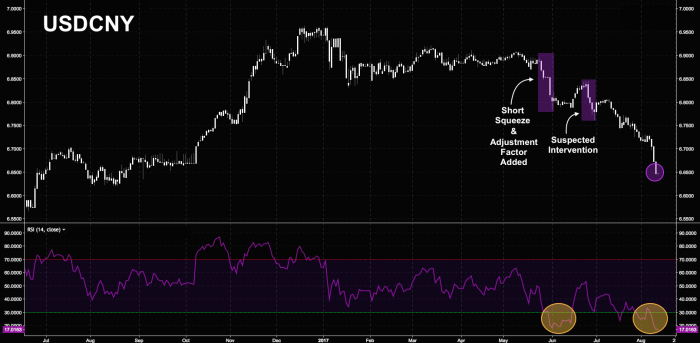Regular readers are fully apprised of virtually every notable development in the Chinese yuan since the late May/ early June PBoC-engineered short squeeze, an event which included the introduction of an absurdly opaque “counter-cyclical adjustment factor†that effectively marked a partial reversal of the FX liberalization push that began in August, 2015.
Over the past couple of weeks, amid escalating tensions between the US and North Korea and as the unravelling of the Trump administration weighed on the dollar, USDCNY hit a 12-month high. Indeed, there was considerable discussion about the extent to which circumstances had conspired to make the yuan a high-yielding safe haven.
Recall this annotated chart from a week ago that gives you some perspective:

Notably, the yuan pushed higher despite disappointing July trade data as traders focused not on the imports/exports miss, but rather on the still sizable surplus.
Minutes (literally) after we originally posted that chart last Friday, the PBoC fired a warning shot about excessive yuan strength, strengthening the fix less than pretty much everyone expected. That caused the USDCNY to rally the most since January.
Well now, with the Trump administration sounding increasingly aggressive with regard to their displeasure around Beijing’s efforts to discourage Pyongyang from further provocations, some folks are concerned that the PBoC might just decide to retaliate by engineering a sharply stronger USD/CNY.
While that could serve as the trigger point for a renewal of capital outflows that by some measures never completely abated, with USDCNY still sitting near a one-year low and with China’s economy cooling off, this wouldn’t be the worst time to create some renewed depreciation, especially if Xi wanted to jab back at Trump.
Of course in addition to sparking renewed capital flight, a quick devaluation would risk another 2015-like episode and it would also undercut confidence in Chinese assets just months after the MSCI inclusion. Needless to say, it could also roil global markets.

